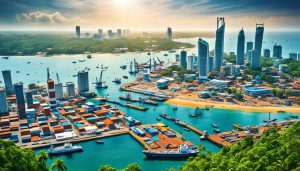
As the zest for authentic travel experiences surges globally, Sri Lanka tourism innovation eagerly adopts the wave of digital transformation in tourism. This strategic move advances the island’s fabled allure, integrating technology for sustainable tourism growth and ensuring that Sri Lanka remains an enchanting destination for contemporary voyagers. The amalgamation of intuitive digital tools and advanced AI facilitates a seamless fusion of rich history with modern convenience, positioning Sri Lanka as an exemplar in the adaptation of technology to enrich tourism.
Key Takeaways
- The implementation of AI in Sri Lanka’s tourism sector customizes experiences for discerning travelers.
- Digital tools are at the forefront of promoting responsible and sustainable tourism in Sri Lanka.
- Enhanced customer service through AI and automation elevates Sri Lanka’s tourist satisfaction levels.
- Smart destination management reduces environmental impact while dispersing tourism benefits.
- Data-driven strategies support the evolution of Sri Lanka’s attractions and services.
Embracing Digital Tools and AI to Pave Path for Tourism Development in Sri Lanka
As Sri Lanka ventures into a new era of tourism development, the country’s industry stakeholders are keenly adopting state-of-the-art digital tools and artificial intelligence (AI). Recognizing the transformative power of this digitalization, Sri Lanka is poised to offer highly personalized travel experiences that cater to the intricate needs and preferences of modern travelers. By implementing AI for tourism growth, the nation seeks to reinvent its traveler engagement model.
The use of digital tools and AI in tourism extends beyond mere convenience; it is about crafting tailored journeys and fostering sustainable tourism development. For Sri Lanka, this means diving into the global currents of travel technology to enhance every visitor’s interaction—from the planning phase to the lasting memories of the journey. AI and machine learning algorithms adeptly sift through travel data, offering insightful recommendations that are aimed to delight travelers and encourage exploration of Sri Lanka’s hidden gems.
However, realizing the full potential of these technologies calls for a concerted effort. The government, private businesses, and academic institutions are urged to join forces to establish a robust digital infrastructure, enact supportive regulations, and nurture a workforce skilled in these advanced technologies. Through this collaborative approach, Sri Lanka aspires to enhance customer service touchpoints and deploy intelligent smart destination management systems that can judiciously balance tourism’s economic benefits with ecological conservation.
Indeed, the emphasis on embracing digital tools and AI to pave the path for tourism development in Sri Lanka is more than just a strategic initiative—it is the country’s commitment to becoming a vanguard of innovative and responsible tourism. This forward-thinking approach not only promises to elevate the visitor experience but also helps preserve the enchanting splendor of Sri Lanka for future generations.
Revolutionizing the Sri Lanka Tourism Experience with Personalized Travel
The advent of AI in tourism development is setting a new benchmark for travel in Sri Lanka. By leveraging AI for tourism growth in Sri Lanka, the industry is transitioning towards a future where each traveler’s experience is meticulously crafted to their unique tastes and preferences.
AI-Powered Travel Recommendations
Artificial Intelligence (AI) stands at the forefront of a personalized travel revolution, promising a transformative impact on Sri Lanka’s tourism landscape. AI algorithms skillfully analyze individual traveler data, such as preferences, behaviors, and interests, to provide targeted travel suggestions. This technology is paving the way for a new era of customized exploration, as visitors are guided to less-trodden paths and discover the island’s diverse offerings in ways that resonate personally with them.
Engaging Visitors with Tailored Experiences
The power of AI extends into forging deep connections between visitors and the diverse cultures of Sri Lanka. By tailoring experiences that spotlight local customs, hidden spots, and community stories, the use of AI enriches the travel journey, creating memorable and bespoke experiences. It’s not simply about seeing new places; it’s about immersing in a narrative that becomes a part of the traveler’s story—a strategy that significantly boosts the allure of Sri Lanka as the perfectly personalized travel destination.
Leveraging Smart Destination Management for Sustainable Growth
Sri Lanka is on the brink of a major digital transformation for tourism, placing smart tourism strategies at the heart of its development plans. The nation, renowned for its verdant landscapes and cultural opulence, is now paving the way for sustainable tourism growth through the adroit use of digitalization and AI. Smart destination management is seen as a solution to some of the most pressing challenges faced by the tourism industry.
In the endeavor to reduce the ecological strain from increasing tourist numbers, Sri Lanka is employing innovative digital tools. These tools enable a more equitable distribution of visitors across various locations, thereby easing the pressure on over-visited sites. By dispersing tourism activity, not only are less frequented locales receiving a visitor boost, but initiatives are also contributing to the conservation of the island’s delicate ecosystems.
Resource allocation, a critical aspect of smart destination management, benefits immensely from real-time data analytics and AI. Effective use of these technologies leads to informed decision-making that significantly enhances traveler experience while also nurturing the environment. As Sri Lanka commits to smart tourism strategies, it sets an example for others by showcasing how to balance the needs of the tourism sector with ecological and cultural stewardship.
This strategic approach to tourism management is bolstered by the unyielding aim to preserve Sri Lanka’s inherent charm. It highlights the crucial interplay between sustainability and tourism, where the digital transformation serves not just the present-day traveler’s desires, but also upholds the interests of future visitors and local communities. It is through such comprehensive and conscientious strategies that Sri Lanka continues to beckon travelers from around the globe.
Enhancing Customer Service with AI and Automation
Advancements in digital solutions for Sri Lankan tourism are setting a new standard in customer service within the industry. These innovations are pivotal in enhancing tourism in Sri Lanka through technology, offering visitors a seamless support experience. The integration of AI and automation into customer service operations revolutionizes the way tourists interact with providers, and ensures Sri Lanka is recognized as a destination embracing modernity and convenience.
Real-Time Assistance Through AI Chatbots
The implementation of AI chatbots signifies a leap forward for tourist support, providing responses and solutions 24/7. This instant access to information about Sri Lanka’s attractions, local customs, and events, via an intuitive platform, has resulted in a marked improvement in the overall travel experience. AI chatbots, by virtue of their efficiency and reliability, contribute to a positive image of the country as a technologically savvy and welcoming destination for global travelers.
Virtual Assistants: Guiding Tourists Effortlessly
Virtual assistants, powered by intricate AI algorithms, have become the unseen travel companions of the digital age, offering step-by-step navigation and assistance. These digital concierges personify the Sri Lankan warmth and hospitality by guiding tourists effortlessly, thereby enhancing their journey and deepening their connection to this enchanting island. Through the use of virtual assistants, Sri Lanka demonstrates its commitment to adopting digital solutions for better tourism experiences.
Immersive Storytelling with AR and VR in Sri Lankan Tourism
In an era where tech innovation in the Sri Lankan tourism sector is increasingly pivotal, Sri Lanka is embracing augmented reality (AR) and virtual reality (VR) to redefine travel experiences. These technologies present an invigorating dimension of immersive storytelling, allowing potential visitors to explore the island’s heritage with a simple headset or smartphone.
The intricate tapestry of Sri Lanka’s history and the vibrancy of its culture are being brought to life through AR and VR experiences. By adopting these forms of augmented reality in Sri Lanka tourism, travelers can virtually wander through ancient temples, lush tea plantations, and bustling street markets before ever setting foot on Sri Lankan soil. It’s an engaging way to capture the imaginations of those planning their travels, cultivating a longing to experience these wonders in person.
Moreover, these virtual reality experiences in tourism serve as powerful marketing tools. They particularly resonate with younger travelers – a demographic that highly values innovation and experiential travel. Through VR, users can embark on thrilling wildlife safaris or dive into the azure waters surrounding the island, experiencing the allure of Sri Lanka’s natural beauty from anywhere in the world. This integration of tech innovation is not just about entertainment; it’s about creating an emotional connection that inspires real-world travel.
Sri Lanka’s foray into AR and VR is indicative of a broader commitment to tech innovation in the tourism sector. These tools are transforming the traditional travel narrative into an interactive journey, and in doing so, they are setting a new standard for destination marketing. As Sri Lanka continues to develop these experiences, it becomes abundantly clear that the future of travel will be vividly augmented by the wonders of technology.
Data Analytics: The Keystone for Strategic Tourism Development
The burgeoning field of data-driven decision making in tourism signifies a transformative chapter for Sri Lanka’s industry. This analytical approach infuses a greater understanding of traveler interests and behavior patterns into every facet of tourism development. With artificial intelligence in Sri Lanka tourism increasingly shaping its future, stakeholders are now harnessing the surge of data to tailor their strategies for maximized impact.
Analyzing Traveler Behavior for Strategic Decisions
Central to the evolution of Sri Lanka’s tourism sector, data analytics serves as an essential tool for dissecting the multifaceted trends and preferences of international and local visitors. By investigating the amalgam of quantitative and qualitative data streaming in from various touchpoints, Sri Lankan tourism authorities and businesses can identify patterns and shifts in consumer behavior. This discerning analysis guides operators towards creating enhanced and more personalized services, aligning with the desires of today’s discerning travelers.
Infusing Data-Driven Insights into Marketing and Infrastructure
In the era of precision marketing, the wealth of insights gleaned from data analytics enables Sri Lanka to sculpt an innovative marketing strategy, one that reaches the right audience with messaging that resonates. Additionally, by embedding these insights into the planning and development of tourism infrastructure, Sri Lanka is purposefully building towards a future where convenience, sustainability, and traveler satisfaction coalesce harmoniously.
Promoting Responsible Tourism Through Digitalization and AI
As Sri Lanka forges a path toward advancing tourism with technology, the country is similarly pioneering in the sphere of sustainable development. By tapping into the capabilities of digital tools and AI, there is a notable shift towards promoting sustainable tourism practices through digital tools, heralding a new chapter for environmentally conscientious travel.
Optimizing Routes for Eco-friendly Travel
In the quest to reduce the carbon footprint associated with travel, Sri Lanka is utilizing sophisticated algorithms to optimize travel routes. These AI-powered solutions are designed to streamline transportation logistics, not only improving the efficiency of travel but also reducing greenhouse gas emissions. Advanced routing technologies serve to guide tourists along the most scenic yet eco-friendly paths, ensuring that the journey is just as pleasurable as the destination while maintaining a low environmental impact.
Employing Technology to Monitor Environmental Impact
Central to the commitment to sustainable tourism, Sri Lanka is deploying technology to meticulously monitor the environmental impact of tourism. Digital applications enable continuous tracking of ecological data, empowering decision-makers to enact policies and practices that mitigate adverse effects on nature. By investing in such technologies, Sri Lanka fortifies its reputation as a leading proponent of green tourism, guaranteeing that the splendors of the island can be enjoyed by future generations in all their pristine glory.
Conclusion
The integration of digital tools and AI into Sri Lanka’s tourism industry is not just an aspiring vision; it’s a fluid, actionable strategy that is reshaping the travel scene. This evolution in embracing digital transformation for tourism development mirrors the global shift towards more connected, efficient, and sustainable practices. For Sri Lanka, this is an inevitable journey towards staying relevant and competitive in the tourism market. The importance of digital tools in Sri Lanka tourism shines through as these innovations offer a myriad of opportunities to satisfy and woo today’s tech-savvy global travelers.
By leveraging this technological pivot, Sri Lanka enriches its tourism narrative, ensuring that every traveler’s story is interwoven with their own personal experiences, making it unique. To forge ahead, it becomes imperative for all stakeholders in Sri Lanka—government agencies, the private sector, and educational institutions—to collaborate, thereby solidifying the nation’s commitment to this digital transformation. It is through this unity and foresight that Sri Lanka can anticipate a future where tourism not only flourishes but also contributes deeply to cultural understanding and environmental preservation.
In conclusion, as the world progresses further into the digital realm, Sri Lanka’s dedication to incorporating advanced digital tools and AI stands as a testament to its adaptive spirit. This approach signifies a bright future wherein the charm of Sri Lankan hospitality is elevated by the precision of the digital age, promising both economic vitality and lasting impressions for travelers seeking extraordinary journeys. By embracing this digital metamorphosis, Sri Lanka stamps its authority as a distinguished destination that harmoniously blends traditional appeals with next-generation innovations in tourism.



